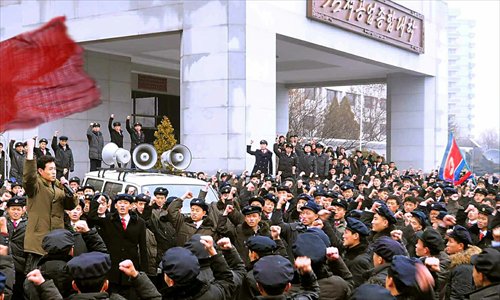Young Kims solidify power

Students at the Kim Chaek University of Technology in Pyongyang rally on Wednesday vowing to protect North Korean leader Kim Jong-un with their lives. Photo: IC
The sacking of veteran North Korean politicians, who played critical roles in the political transition after late leader Kim Jong-il's death, seems to have led to the "sooner-than-expected" power consolidation by North Korean leader Kim Jong-un and his siblings.
In an interview with South Korean newspaper the Chosun Ilbo, Lee Yun-keol of the North Korea Strategic Information Service Center claimed that Kim Jong-un's elder brother Kim Jong-chol "personally led" a team of soldiers to arrest Jang Song-thaek, Kim Jong-un's uncle who was once the North's second-most powerful man.
Citing a source in the military corps protecting Kim Jong-un, Lee told the paper that the arrest occurred around November 8 after "careful planning."
Kim Jong-un secretly formed a taskforce headed by Kim Jong-chol to plan Jang's ouster, made up of a few handpicked officials from the bodyguard unit, according to Lee.
Lee, who defected from North Korea in 2001, confirmed the report when reached by the Global Times on Wednesday, saying he talked to the source whom he met on December 5.
Kim Jong-chol, 32, is the middle son of Kim Jong-il. He was widely believed to have been staying out of North Korean politics in the past.
Lee said he was back in the political realm earlier this year as the head of "Ponghwajo (Torch Group)," a group of offspring of senior party and military leaders who control secret funds.
Meanwhile, South Korean media said Kim Jong-un's sister Kim Yeo-jeong, 26, now holds a critical position in the North's powerful National Defense Commission.
Lee insisted the sacking of Jang was carried out thoroughly by the Kim family and was in Kim Jong-il's will, which details methods to consolidate the third generation's rule.
Jang, who was dismissed from all his posts for "anti-party, counter-revolutionary factional acts," wasn't the first senior official sacked after the senior Kim's death. Five out of seven officials who escorted the limousine carrying Kim Jong-il's coffin alongside Kim Jong-un are now out of power.
Jin Qiangyi, director of the Asian Studies Center at Yanbian University, told the Global Times that the shifting of power to the young Kims was long expected, but it has come too soon and raised concerns over their untested capabilities.
"The Kims may have been forced to accelerate the transition as a result of Jang's increasing power and rumors about him trying to challenge Kim Jong-un," Jin said, noting that Pyongyang is expected to segregate the power held by Jang instead of filling the vacuum.
The purge of Jang, who was believed to have championed economic development, added to fears about the North's economic difficulties, as the Yonhap News Agency reported that Pyongyang began to sell large amounts of gold to China several months ago.
Yonhap quoted a source as saying "overseas sales of gold are a barometer of whether the North Korean economy is in crisis."
However, Liu Ming, director of the Center for Korea Studies under the Shanghai Academy of Social Sciences, told the Global Times the purge of Jang is not likely to make Pyongyang shift away from economic development, as Kim Jong-un has vowed to pursue nuclear weapons and economic modernization at the same time.
Liu said a series of purges will follow Jang's ouster so the North is not likely to change its foreign policy or launch military provocation in the short term. "At least in the coming six months, Pyongyang will stay put," Liu said, noting it also needs to maintain economic stability to guard off risks of public upheaval.
An official with the trade department in Dandong, a Chinese city neighboring North Korea, told the Global Times that there has been no sign of a recovery for China-North Korea trade lately and the North is short of money.
Jang used to handle Sino-North Korea trade and economic projects, including economic zones in Rason city and the Hwanggumphyong and Wihwa islands.
Liu noted this purge will have little impact on those projects, the development of which has been stagnant for the past year as a result of UN sanctions against Pyongyang's third nuclear test.
However, he raised the concern that Jang's purge led to a decrease of China hands among North Korea's leaders, and the younger generation in the regime lack experience in dealing with China.
"However, personal ties never play a decisive role in the two neighbors' relationship," Liu said, noting that Pyongyang will try to maintain its friendly ties with Beijing given its isolated status.
Jin shared similar views, noting the North is going to actively mend its ties with China, perhaps by sending an envoy to exchange its views with the Communist Party of China over Jang's ouster.
"Meanwhile, in fear of a further complicated situation on the Korean Peninsula, China might also reach out to the North to bridge the gap," he said.
Jang's purge will result in an early visit of Kim Jong-un to China early next year, Lee and other South Korean experts speculate. "Originally, Kim's visit was planned to happen in November, but it's said that there were many preconditions by China," Lee said.
Liang Chen contributed to this story
Read more in daily special: N.Korean leader’s uncle purged from power